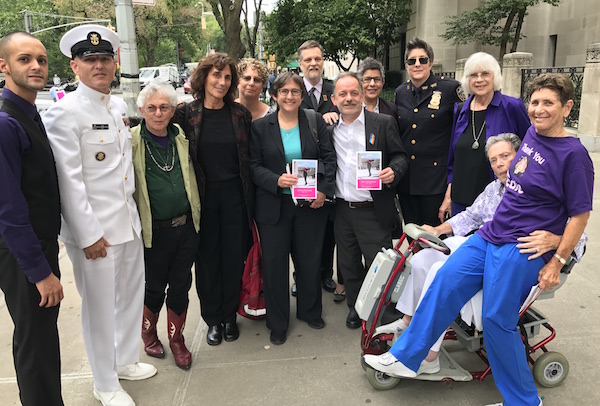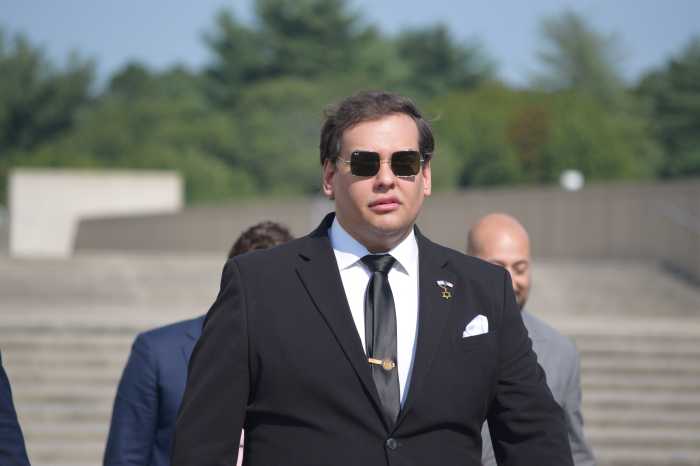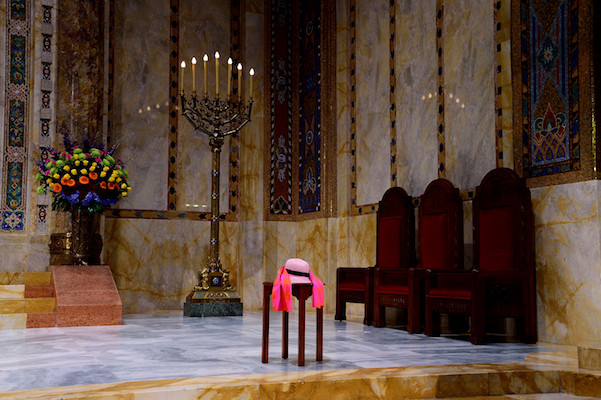
BY ANDY HUMM | Outside the Upper East Side’s Temple Emanu-El on Fifth Ave., Edie Windsor’s comrades from the grassroots marriage equality movement lined up more than an hour and a half early to make sure they would get a seat inside for her Sept. 15 memorial service. These were the people from Marriage Equality New York whom Edie sought out in order to marry Thea Spyer in 2007. After the couple worked with these activists on the front lines of that cause, they helped connect Edie to the legal help she needed after Thea’s 2009 death to get her marriage recognized by the federal government.
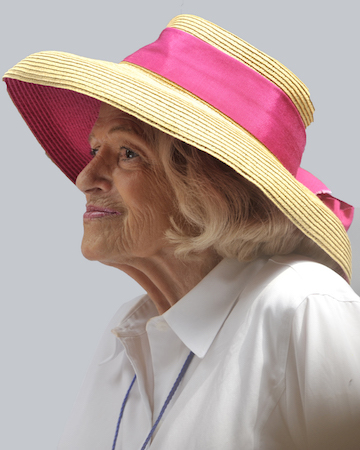
The world will remember Edie, who died at age 88 on Sept. 12, as the successful plaintiff in United States v. Windsor in 2013, a challenge to the Defense of Marriage Act that secured full federal recognition of all same-sex marriages legal in the states. But hundreds gathered last week to celebrate her as more than just a brave and determined plaintiff in a landmark Supreme Court case, but as a singular human being full of life and love. Like Gilbert Baker, the Rainbow Flag’s creator who died earlier this year, and Father Mychal Judge, the Fire Department chaplain who perished in the 9-11 catastrophe, she was a gay person who touched the lives of millions — and those who encountered her felt a deeply personal connection. (The service can be viewed at https://venue.streamspot.com/video/07b68277b0.)
Inside, we were joined by civic leaders from Mayor Bill de Blasio and Public Advocate Letitia James to Congressmember Jerry Nadler and out LGBTQ elected officials. We heard from Edie’s lawyer and friend Roberta Kaplan, her relatives and longtime friends, and — to the surprise of many — Hillary Clinton, in a service led by Rabbi Sharon Kleinbaum of Congregation Beit Simchat Torah. But most everyone in the pews had a significant Edie story of their own, as well.
Michael Sabatino, now a Yonkers city councilmember, standing with his husband, Robert Voorheis, outside ahead of the service, said, “She came to a Marriage Equality meeting and said, ‘My partner has MS. I need to get married in Canada.’”
At that point in 2007, Sabatino and Voorheis were already in court fighting right-wing attempts to deny them recognition of their Canadian marriage in New York.
“We put her in touch with Brendan Fay” who had also married in Canada and, with Jesús Lebron, ran the Civil Marriage Trail to get American same-sex couples married there, Sabatino added.
Fay persuaded Judge Harvey Brownstone, an out gay Toronto jurist, to travel to a hotel near the airport there to marry the ailing and wheelchair-dependent Thea to Edie.
Edie never forgot Fay’s help, showing up for all his St. Pat’s for All fundraisers in support of his inclusive St. Patrick’s Day parade in Queens.
“At the Irish Arts Center, she would get up on the stage with Malachy McCourt to sing our anthem, ‘Wild Mountain Thyme,’” Fay said.
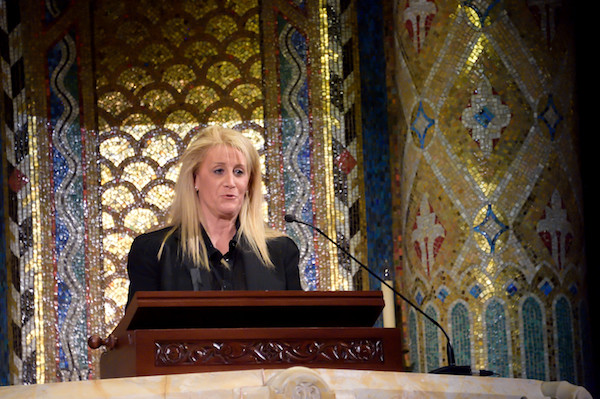
When his group, Lavender & Green, became the first Irish LGBTQ contingent allowed to march in the Fifth Ave. St. Patrick’s Parade in 2016 after a 25-year battle waged by the Irish Lesbian & Gay Organization and Irish Queers, Edie didn’t just show up. At 86, she marched the entire route and joined the afterparty in the East Village that evening.
“She showed us how to love in tough times,” Fay said.
Paul Schindler, editor of Manhattan Express and Gay City News, said, “I remember first seeing Edie and Thea — not knowing who they were — as nice old ladies at a meeting of marriage activists at the Center where the average age was probably 29. I was touched to see them, but didn’t realize these were the women who were going to change everything.”
Activist Jay W. Walker said, “She was tireless and attended almost every action with Gays Against Guns and Rise and Resist. Turn a corner and there was Edie. She never stopped her activism and did it with such joy.”
Historian Blanche Wiesen Cook and playwright Clare Coss, a power couple of the progressive LGBTQ movement together for 48 years, were close to Edie since the 1970s.
“She was a force of love and joy,” Cook said, to which Coss added, “She made people feel they could do the impossible. She cared so much about equality and justice.”
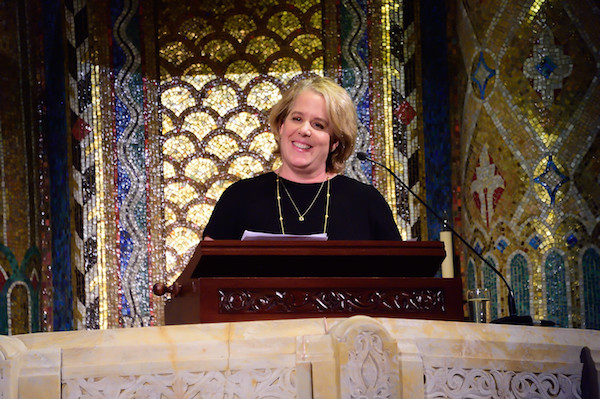
Cathy and Sheila Marino-Thomas, leaders in Marriage Equality New York, worked alongside Edie for years.
“When she walked out of the Supreme Court, she walked over to our kids to let them know it went well,” Cathy recalled of Edie’s big day before the nine justices in March 2013.
James Esseks, co-counsel on the Windsor case for the American Civil Liberties Union, said, “I remember Edie saying that if she had to lose Thea, she would make something of it. And she did — not only a change in the law but she became a symbolic face so every American could better understand same-sex relationships. She turned a personal tragedy into a triumph for all LGBT people.”
Columbia University law professor Suzanne Goldberg, who at Lambda was co-counsel for the defendants in the 2003 Lawrence v. Texas case that ended anti-sodomy laws in the US and was among those who submitted an amicus brief in the Windsor case, said before the service, “In addition to being beautiful, committed, and funny, she was fiercely brilliant.” Goldberg recalled, “She said she’d read every word of my brief and proceeded to stun me. Many lawyers don’t even do that.”
Judith Kasen-Windsor, married to Edie just shy of one year, bravely led the speakers at the service.
“She was an international symbol of LGBTQ rights,” she said, “but she was simply my love.”
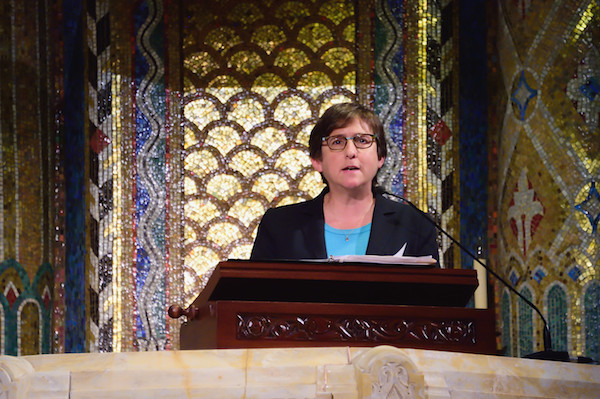
Rabbi Kleinbaum said, “Edie changed the world with a specific action, but like Rosa Parks she was part of a movement. She knew it took all of us to change the world.”
Lewis Freeman, Edie’s first cousin once removed, spoke during the service about how that famous picture of Edie outside the Supreme Court with her arms spread wide resulted from her spotting her family members and breaking away from the press conference to greet them.
“She was always Edie in public and in private,” said Freeman. “It didn’t matter how many people were around… For Edie, family wasn’t limited by blood relatives. You were all her family.”
His mother, Sunnie Baron Freeman, recalled always being very close to her cousin, but because she was 14 months younger, Edie, even to their final phone conversation last week, called Sunnie “Baby.”
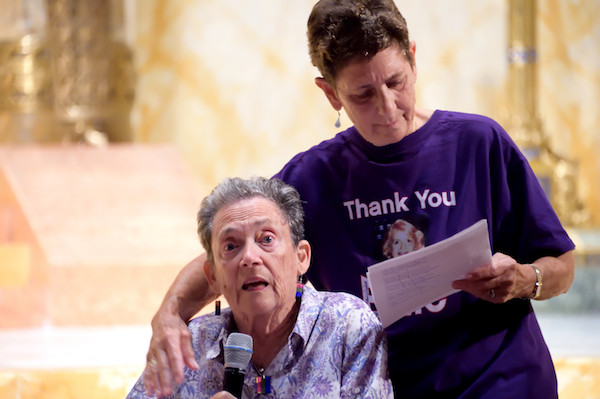
Edie’s longtime friends Marjorie Sherwin and Rose Walton did a moving reading of Maya Angelou’s poem “Still I Rise” that contains the lines, “Does my sexiness upset you? Does it come as a surprise?” Indeed, one of her doctors, Rosanne Leipzig, said Edie had been scheduled next month to speak to her fellow gerontologists about “love and sex” after 80.
Karen Sauvigne said, “My friend Edie Windsor was brilliant to her dying day, lighthearted and beautiful.” She spoke of Edie’s pioneering work at IBM in the 1950s “achieving the highest technical rank — rare for a woman” at that time — and how proud Edie was to have “the first personal computer delivered to a New York address.”
Sauvigne added, “Edie’s love was vast and boundless. She made everyone feel special.”
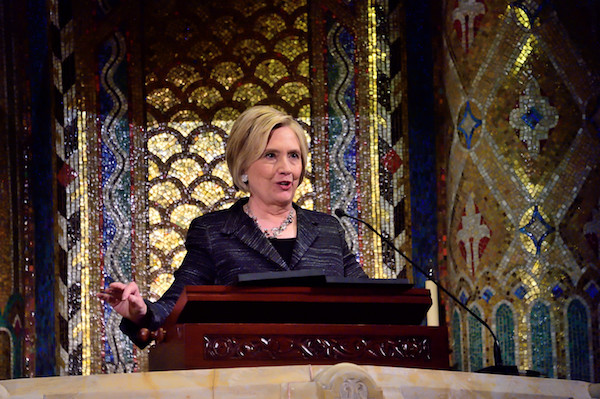
Hillary Clinton was greeted with a standing ovation and gave a well-received speech that included the line, “Edie helped change hearts and minds, including mine,” a reference to her only embracing same-sex marriage in 2013, after leaving the State Department and prior to her second presidential run. Activist Jackie Rudin wrote on Facebook, “I loved that Hillary’s presence did not overwhelm. She came with just the right amount of reverence and respect.”
Clinton said, “How she experienced loss, grief, and injustice made her only more generous, more open-hearted, and more fearless in her fight. She refused to give up on the promise of America. There wasn’t a cynical, defeatist bone in her body. That’s especially important for us to remember now.”
Michael Adams, executive director of SAGE, or Services and Advocacy for GLBT Elders, which honored Edie’s achievements years before her famous case, said, “In so many ways, Edie was our mother. She made every one of us, her children, feel as if we were the apple of her eye.” He also said, “With Judith, she reminded us that we can have love and romance at any age.”
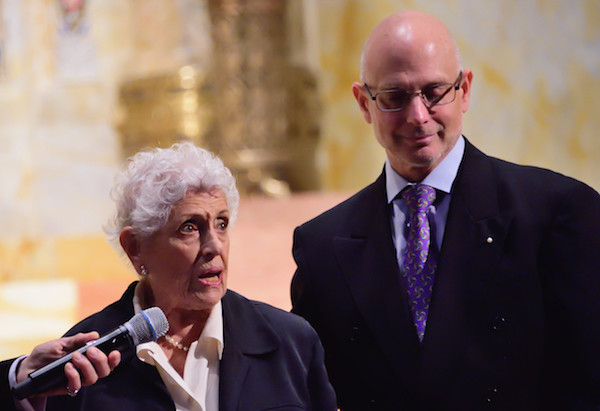
Roberta Kaplan, who took on the DOMA case independently after the LGBTQ legal groups initially turned Edie down, delivered what was a moving elegy, saying, “The fact that Edie was the perfect plaintiff was obvious to me from the moment we met.” Kaplan recalled sharing her concerns about the health of Edie’s heart throughout the litigation, pushing the district court judge to rule quickly.
“Edie was never shy about describing the two maxims that she and Thea lived by: ‘Don’t postpone joy’ and ‘Keep it hot,’” Kaplan said. “While I had no issue with ‘don’t postpone joy’ — in fact, it’s a lesson I have tried very hard to keep in mind ever since — ‘keeping it hot’ was a different story.”
Kaplan won Edie’s pledge that she would not talk publicly about sex while the case was pending, even though “she made it clear she did not agree with my strategy.” They won the case “at 10:03 a.m. on June 26, 2013. I can assure you that Edie was publicly talking about sex before noon.”
Kaplan continued, “As a lawyer, there are moments with a client when you hold your breath. Perhaps none is scarier than when your client speaks at a press conference for the first time while a case is pending, which Edie did the day we filed our complaint. But from the moment she opened her mouth, that 4’11”, 95-pound Jewish lady with perfectly manicured nails and perfectly coiffed hair explained with such clarity and humanity why her rights, and all of our rights, should not be denied.”
“Edie saw in her lifetime the seemingly impossible dream of marriage that she and Thea shared when they got engaged back in 1967 become reality for gay and lesbian couples across the nation and now even the world,” Kaplan said. “In fact, she had a huge role in making that happen. And Edie rightfully exercised that right with the utmost joy when she married the second great love of her life, her beloved spouse Judith, last year.”
We filed out to a heartbreaking rendition of “Over the Rainbow” from Cantor Steven Zeidenberg. The LGBTQ anthem can be a cliché, but here it allowed us a release at the loss of the woman who indeed brought us… well, over the rainbow.
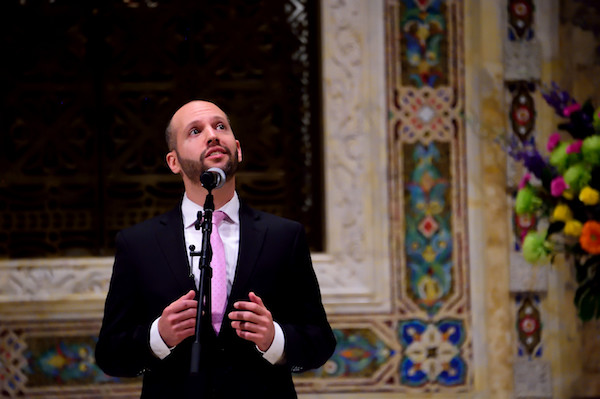
Outside the service, Navy Master Chief Petty Officer Dwayne D. Beebe-Franqui, with his husband Jonathan, talked about how three years ago he got Edie to speak to more than 400 LGBTQ military service members and spouses in Washington and how Edie said to him, “You continue to love and support that man because you need him and he needs you.”
She was a bit of an evangelist for marriage. Edie became friends with the men, inviting them to her Hamptons place, where Beebe-Franqui helped her identify medals Thea’s father won in the Dutch Army before fleeing the Nazis.
Jim Obergefell, whose 2015 Supreme Court case, building on the Windsor victory, won same-sex marriage rights for all Americans, said after the service, “It perfectly captured Edie: irreverent, political, warm, and loving.”
